Guest Posting From Chabakuk Elisha - Rabbi Menachem Mendel of Vitebsk
This Shabbos, the second day of Rosh Chodesh Iyar, we remember the passing of Rabbi Menachem Mendel of Vitebsk. Interestingly, R’ Mendel seems to be somewhat overlooked among the great early Chassidic Rebbes; as a student of the Baal Shem Tov and his successor the Maggid, as well as being the appointed Rebbe for White Russian/Lithuanian Chassidim (by the Maggid), and according to many, the Maggid’s subsequent successor until his ultimate departure for the Holy Land, one would think that R’ Mendel would be spoken of as often, if not more often, than many of his contemporaries or later Chassidic leaders.
There are a number of reasons why this is not the case, but we can leave that for another time. For some reason, R’ Mendel has always been different for me. As a young ice-cream-and-apple-pie-eating American boy growing up in New England, Eastern Europe was not a place that I easily felt connected to. My parents & grandparents were American, and almost everything I knew was American. However, my great-grandparents were immigrants - and one city that I had heard mentioned on various occasions was my grandmother’s mother’s hometown of Vitebsk. Therefore (yes, I realize this is a somewhat weak connection), when I heard of Reb Mendel Vitebsker, I instantly felt connected.
Admittedly, this is an oversimplification, and I’ve left out all the details and ancillary bits of information that go with it, but as the years of my youth flew by, I was exposed to a number of - often quite different - lifestyles, groups and denominations, each with their own variant claims and beliefs. I was never sure how a simple human being was supposed to be capable of sorting it all out, and concluding which path was the "right path." After a while I concluded I didn’t have to do so at all; instead, I just had to decide which path was right for me, and leave the decision of right vs. wrong to the ideologues.
That’s not to say that this is always easy, but generally it seems that the "right path" is either the path that we inherit, or that feel most attracted to - and since I felt a inherited connection to Reb Mendel, and was attracted to him, I found Reb Mendel to be the most qualified for the job, which incidentally solidified my already preexistent exposure to Chabad Chassidus: Although there is no "Vitebsker" Chassidic dynasty, with Rebbes descending from Reb Mendel, he was not without spiritual heirs. His influence among the Maggid’s students was quite significant, and for Chassidim of White Russia, especially so. More than any other specific group (as the Baal HaTanya was devoted to Reb Mendel) Chabad Chassidus has carried on Reb Mendel’s path (albeit, with many subsequent developments).
Perhaps a lot of it is in my head, but Reb Mendel has had a significant influence on my life. As his Yahrzeit approaches (not to mention that my son’s birthday (Menachem Mendel, of course) is this Sunday) I hope that his light will continue to shine for me, and for an ever growing number of people. Although at various time I have attempted to learn (at least something) from R’ Mendel every week, I hope that I will understand R’ Mendel better this year. But since the idea of this posting was not supposed to be about me, I guess the real post begins here:
Reb Mendel was born in Turchin (outside of Cherson) to R’ Moshe and his wife Esther. His father was a student and chossid of the Baal Shem Tov, and R’ Mendel’s childhood teacher was none other than the Baal Shem Tov’s successor, R’ Dov Ber, the Maggid of Mezritch. Therefore, he grew up with and among Chassidim, even visiting the Baal Shem Tov on two occasions (stories of their own). Many years later, while living in Vitebsk, he was appointed by the Maggid as Rebbe for all Chassidim in White Russia, due to the danger and hardship that the journey to the Maggid in Mezritch entailed.
He was incredibly humble; in fact, it is this trait that he is best known for. As Rebbe, he was the image of nobility. He wore fine clothing and had a stately presence; yet, he was the most humble and modest of men. Regardless of the external opulence, his heart was torn, his ego non-existent, and his humility unparalleled; he considered himself the lowest of all beings. Once, he was questioned about his custom of signing his name followed by the words, "hashafal b’emes (the truly lowly)," to which he replied, "One cannot call himself ‘truly lowly’ if he is even slightly impressed by the entourage that accompanies him."
He is credited as the source of Chabad Chassidus, as many of the concepts elaborated on by the Baal HaTanya can be found in short in Reb Mendel’s seforim. He tried unsuccessfully to make peace with the early opponents of Chassidus, and even led and directed various attempts to sit down with opposition leaders to bring about peace - famously, the Vilna Gaon refused to meet with him (and the Baal HaTanya), dooming any hopes of acceptance in their lifetime.
Yet, he harbored no ill-will towards those who opposed and persecuted him (he was forced from his position as Rav in Minsk among many other tribulations at the hands of his enemies), and although he preached a path of Chassidus, he didn’t attack the (harsher) path of his opponents, cautioning: "Do not belittle those preachers who speak harshly. They are legitimate, and come from the spirit of the Prophet Yirmiyahu who spoke words of rebuke and punishment. It is only that now, at this time, our generation suffers so greatly and lives amid such hardship that they need to hear words of consolation and encouragement instead."
Once it was clear that the opposition against Reb Mendel and Chassidim was not to weaken any time soon, he and 300 fellow Chassidim set out to live in the Holy Land in the year 1777, ultimately settling in Tiveria until his passing on the second day of Rosh Chodesh Iyar in 1788.
I have always found the directives left in Reb Mendel’s will to be fascinating, so I include them here:
R’ Mendel’s first Last Will & Testament (Tzefat, 5 Elul 1777, upon arrival from Europe):
1. Upon my passing I beseech of the burial society not to allow my body to remain unburied for more than one hour, no matter what.
2. The clothing that I am to be dressed in should specifically be my clothing that I brought from Europe.
3. I should not be placed in a coffin.
4. Those who carry me to burial should not speak at all - even words of Torah. They should only think thoughts of true repentance, and I will be in a place where even the perfectly righteous cannot stand, and therefore there are no evil forces (G-d forbid).
5. At the burial site do not place me in the ground while on the cot as is customary; rather, carry me on the cot by hand and remove my body from it, placing me in the burial plot. There should be no wooden planks (G-d forbid), only my body against the holy earth.
6. When my eyes are closed by means of a pottery shard, as is customary, and when forks are placed in my hand, as is customary, mention the holy names of our master the Baal Shem Tov, and the holy name of the Maggid of Mezritch, OB"M.
7. Immerse in a kosher Mikva, and it should specifically be a fresh Mikva.
8. Don’t perform hakafos with my body (carrying the body in circles around the gravesite) for this will lengthen the time and exceed the hour that I requested (see item#1) not to remain unburied.
9. All of my clothing, both Shabbos finery and weekday clothing, including my Zupitze with silver buttons, should be used to help the poor.
Signed, and witnessed by:
R’ Avrhom son of Alexander Katz of Kalisk
R’ Yisroel of Polotzk
The second Last Will & Testament, left for his son R’ Moshe prior to his passing:
1. Never accept any appointed positions.
2. Never quarrel with the Sephardic (local) Jews - for whatever reason - or criticize their actions, whatever they may be.
3. Never take part in any feast, such as a wedding feast or circumcision - neither with the Sephardim or the Ashkenazim (Europeans) - except for once a year, with very close friends. And even then, only if all those close friends and seekers of truth agree.
4. Never drink during the week, neither spirits nor wine, whatsoever - only do so when you have a guest or if there is a specific reason, then you should only drink one cup. On Shabbos it is permitted to drink an ounce of Arak, and two or three ounces of wine - not more.
5. Never become intoxicated, even on Purim or Simchas Torah - drink only two or three cups of wine.
6. Don’t waste money inviting many guests - rather, invite one guest and treat him properly, and Hashem will bless you.
7. Do not dress up in fine clothing - wear average clothing.
8. Keep away from honor.
9. Keep away from frivolity - take pleasure in Hashem and in serving Him.
10. Study ethical works every day (Musar - obviously this refers to what was considered Musar at that time, not be confused with the later ‘Musar movement").
11. Befriend those who seek truth.
12. Love even the lowest of Jews.
13. Keep away from falsehood with all your might - even for the sake of Heaven.
14. Don’t sign you name with the title Rabbi - rather use the common usage of, "Son of our master and teacher."
15. Do not repeat words of Torah in my name.
16. Sell all my valuables, i.e. all vessels of silver or gold, all ornaments of silver or gold, all watches, tables, beds, benches, valuable kilmesh (?), bedding, Shabbos clothing, including my Shabbos Talis, earthenware containers, glass containers, extra wine, oil & wheat - all for 1000 grush to sustain my widow, my son’s mother. It is up to her to take …(unclear) if she so desires.
17. Lend the entire 1000 grush to the Ashkenazic Kollel for the members to invest, and they should in-turn give my widow three grush a week.
18. If the entire amount comes out to be less than 1000 grush, let the difference be made up with the amount of funds that are to come in my name the following year.
19. All additional funds and extra profit from my son’s business (estimated by average expectations) should be lent to the Ashkenazic Kollel to invest.
20. My son should not reside in one home together with his mother even for a single hour; rather, she should be given her own apartment below.
21. Give 100 grush for my orphans.
22. Pay 30 grush every year towards the upkeep of the Ashkenazic synagogue in my name, for as long as possible.
23. Do not engrave any praise on my tombstone; simply write "MOH"R (our master and teacher) Menachem Mendel"
Witnessed by:
R’ Avrohom son of Alexander Katz of Kalisk
(The second witness did not sign for he was afraid to include himself with R’ Avrohom of Kalisk)







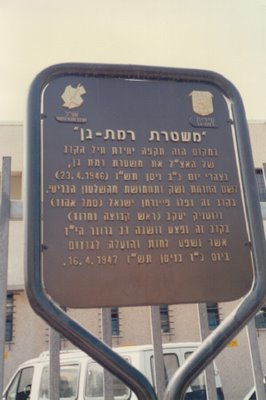

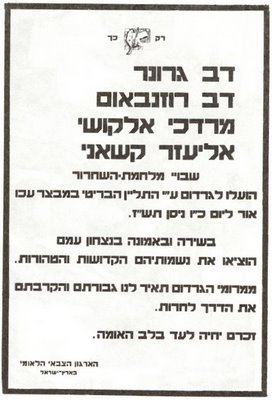

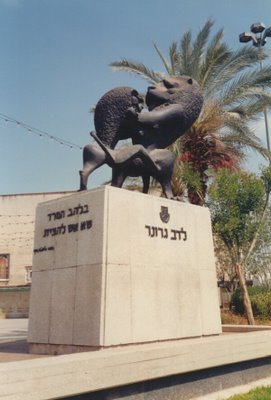


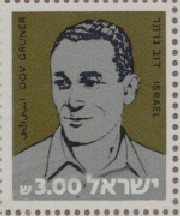



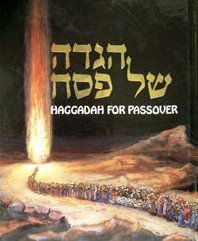


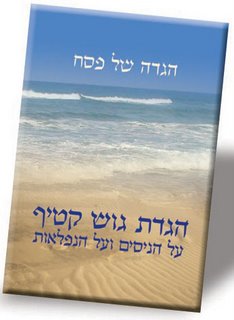


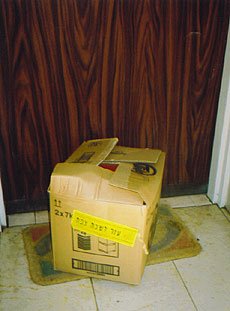 An Eizer L'Shabbos food package left at someone's door
An Eizer L'Shabbos food package left at someone's door









